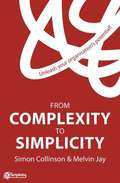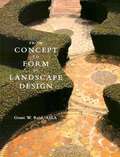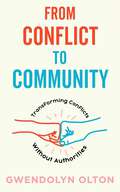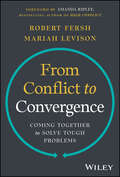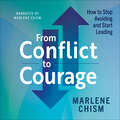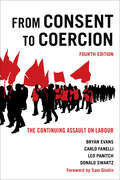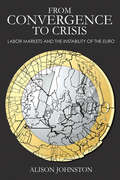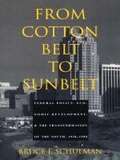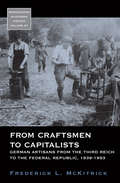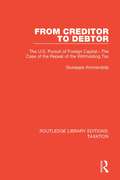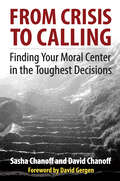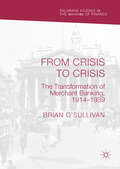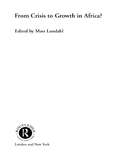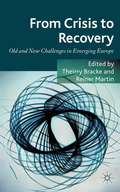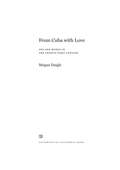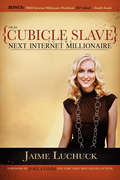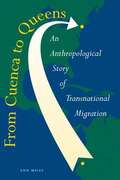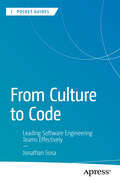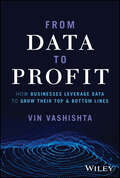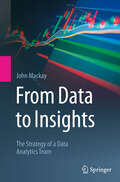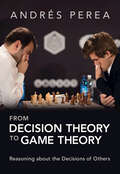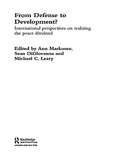- Table View
- List View
From Complexity to Simplicity
by Simon Collinson Melvin JayComplexity is slowing companies down, costing them on average 10% of their profits. Based on cutting-edge research, this practical 'how to' guide will show businesses how to remove complexity to boost profits and morale.
From Concept to Form in Landscape Design
by Grant W. ReidFrom Concept to Form in Landscape Design provides vital, functional techniques that make the transformation easier and more effective.
From Conflict to Coalition
by Adam DeanInternational trade often inspires intense conflict between workers and their employers. In this book, Adam Dean studies the conditions under which labor and capital collaborate in support of the same trade policies. Dean argues that capital-labor agreement on trade policy depends on the presence of 'profit-sharing institutions'. He tests this theory through case studies from the United States, Britain, and Argentina in the late-nineteenth and early-twentieth centuries; they offer a revisionist history placing class conflict at the center of the political economy of trade. Analysis of data from more than one hundred countries from 1986 to 2002 demonstrates that the field's conventional wisdom systematically exaggerates the benefits that workers receive from trade policy reforms. From Conflict to Coalition boldly explains why labor is neither an automatic beneficiary nor an automatic ally of capital when it comes to trade policy and distributional conflict.
From Conflict to Community: Transforming Conflicts Without Authorities
by Gwendolyn OltonConflict is everywhere: our living rooms, our streets, our community organizations, and every corner of the internet. But few of us have the training to successfully intervene or resolve these conflicts. In these pages, experienced peacemaker Gwendolyn Olton shows you how to use your existing skills and intuition to transform a wide variety of conflicts from insurmountable impasses to working relationships where everyone's needs are met. The result is a practical, kind, realistic guidebook for anyone who's found themselves in a conflict (their own or someone else's) and wondered, "How did we get here and what can I do to make it better!?"The book is broken up into three sections: learn the basics of conflicts, help others work out their conflicts, and finally, resolve and heal the conflicts in your own life. Filled with real life examples and thought-provoking scenarios, Olton offers a variety of conflict analysis and conversation tools that you can use to navigate the most challenging interpersonal dynamics, and to better understand yourself and others along the way—all without calling HR or the cops.
From Conflict to Convergence: Coming Together to Solve Tough Problems
by Robert Fersh Mariah LevisonStrategies to achieve meaningful and lasting conflict resolution In From Conflict to Convergence: Coming Together to Solve Tough Problems, two expert collaborative problem solvers deliver an incisive, hands-on guide to de-escalating conflict and constructively engaging with those you disagree with to find better solutions to problems. In this book full of real-life stories and examples, you'll find a collection of tried and tested strategies you can employ immediately as you negotiate and navigate your most seemingly intractable conflicts. You'll learn how finding what the authors call “higher ground” can advance your interests even when facing people and groups you think you have little in common with and how this can set the stage for longer term cooperation. The authors explain how to improve your ability to understand how other people think, feel, and perceive the world around you, and how to use that knowledge to develop mutually beneficial solutions that help advance your interests and the interests of the people you're dealing with. You'll also find: Strategies for distinguishing the message from the messenger, so you can appreciate the arguments and intentions of imperfectly-presented positions Techniques for responding to emotional and powerful conflicts and disagreements without getting lost in argument Ways to find breakthrough solutions to long-term conflicts that have failed to respond to previous attempts at resolution Perfect for business and organizational leaders, board members, community and religious leaders, public servants, mediators, and anyone else looking to find common ground with people with differing views and perspectives, From Conflict to Convergence also speaks to concerned citizens looking for concrete pathways to lessen troubling divides in their workplaces, their communities, and society at large. From Conflict to Convergence is a must-read resource for an increasingly combative and conflicted world.
From Conflict to Courage: How to Stop Avoiding and Start Leading
by Marlene ChismA framework to help managers defuse disagreements in the workplace and turn conflict into an opportunity for growth. Unresolved workplace conflict wastes time, increases stress, and negatively affects business outcomes. But conflict isn't the problem, mismanagement is. Leaders unintentionally mismanage conflict when they fall into patterns of what Marlene Chism calls &“the Three As:&” aggression, avoidance, and appeasing. &“These coping mechanisms are ways human beings avoid the emotions that come with conflict,&” says Chism. In this book she shows how to fearlessly deal with conflict head-on by expanding your conflict capacity. Conflict capacity is a combination of three elements. The foundation is the Inner Game—the leader's self-awareness, values, discernment, and emotional integrity. The Outer Game is the skills, tools, and communication techniques built on that foundation. Finally, there's Culture—the visible and invisible structures around you that can encourage or discourage conflict. Chism offers exercises, examples, and expert guidance on developing all three elements. Leaders will discover techniques to increase leadership clarity, identify obstacles, and reduce resistance. They'll develop powerful skills for dealing with high-conflict people and for initiating, engaging in, and staying with difficult conversations. Readers will learn that when they see conflict as a teacher, courageously face it, and continually work on transforming themselves, they can get the resolution they are seeking. They can change minds. &“A very practical and excellent how-to guide.&” —Bill Stoller, CEO and founder, Express Employment Professionals &“An actionable blueprint for how to handle . . . difficult conversations.&” —Tanveer Naseer, MS, Inc. Top 100 leadership and management expert, author of Leadership Vertigo
From Consent to Coercion: The Continuing Assault on Labour, Fourth Edition
by Leo Panitch Bryan Evans Carlo Fanelli Donald SwartzFrom Consent to Coercion examines the increasing assault against trade union rights and freedoms in Canada by federal and provincial governments. Centring the struggles of Canadian unionized workers, this book explores the diminution of the welfare state and the impacts that this erosion has had on broader working-class rights and standards of living. The fourth edition witnesses the passing of an era of free collective bargaining in Canada – an era in which the state and capital relied on obtaining the consent of workers and unions to act as subordinates in Canada’s capitalist democracy. It looks at how the last twenty years have marked a return to a more open reliance of the state and capital on coercion – on force and on fear – to secure that subordination. From Consent to Coercion considers this conjuncture in the Canadian political economy amid growing precarity, poverty, and polarization in an otherwise indeterminate period of austerity. This important edition calls attention to the urgent task of rebuilding and renewing socialist politics – of thinking ambitiously and meeting new challenges with unique solutions to the left of social democracy.
From Convergence to Crisis: Labor Markets and the Instability of the Euro
by Alison JohnstonWhat explains Eurozone member-states' divergent exposure to Europe’s sovereign debt crisis? Deviating from current fiscal and financial views, From Convergence to Crisis focuses on labor markets in a narrative that distinguishes the winners from the losers in the euro crisis. Alison Johnston argues that Europe’s monetary union was structured in a way that advantaged the corporatist labor markets of its northern economies in external trade and financial lending. Northern Europe’s distinct economic advantage lay not with its fiscal capabilities, which were not that different from those of southern Eurozone countries, but with its wage-setting institutions. Through highly coordinated collective bargaining, the euro North persistently undercut the inflation performance of southern trading partners, destining them to a perpetual cycle of competitive decline and external borrowing. While northern Europe’s corporatist labor markets were always low inflation performers, monetary union ultimately made their wage-setting institutions toxic for the South. The euro’s institutional predecessor, the European Monetary System, included economic and institutional mechanisms that facilitated macroeconomic adjustment and convergence between the common currency’s corporatist and noncorporatist economies. Combining cross-national statistical analysis with detailed qualitative case studies of Denmark, Germany, Italy, Ireland, the Netherlands, and Spain, Johnston reveals that monetary union’s removal of these mechanisms allowed external imbalances between these two blocs to grow unchecked, underpinning the crisis in which Europe currently finds itself. Rather than achieving the EU’s goal of an ever-closer union, the common currency produced a monetary environment that destabilized the economic integration of its diverse labor markets.
From Correlation to Causation
by Feng Zhu Karim R. LakhaniTo make sound business decisions, managers must be comfortable with the concepts of correlation and causation. This background note provides an overview of correlation and causation using examples and explains why the former does not imply the latter. It also describes several methods for gaining insights into causal relations, including randomized experiments, panel data, matching, and regression discontinuity. The note is intended for a general audience and does not require advanced statistics knowledge.
From Cotton Belt to Sunbelt: Federal Policy, Economic Development, and the Transformation of the South 1938–1980
by Bruce J. SchulmanFrom Cotton Belt to Sunbelt investigates the effects of federal policy on the American South from 1938 until 1980 and charts the close relationship between federal efforts to reform the South and the evolution of activist government in the modern United States. Decrying the South's economic backwardness and political conservatism, the Roosevelt Administration launched a series of programs to reorder the Southern economy in the 1930s. After 1950, however, the social welfare state had been replaced by the national security state as the South's principal benefactor. Bruce J. Schulman contrasts the diminished role of national welfare initiatives in the postwar South with the expansion of military and defense-related programs. He analyzes the contributions of these growth-oriented programs to the South's remarkable economic expansion, to the development of American liberalism, and to the excruciating limits of Sunbelt prosperity, ultimately relating these developments to southern politics and race relations. By linking the history of the South with the history of national public policy, Schulman unites two issues that dominate the domestic history of postwar America--the emergence of the Sunbelt and the expansion of federal power over the nation's economic and social life. A forcefully argued work, From Cotton Belt to Sunbelt, originally published in 1991(Oxford University Press), will be an important guide to students and scholars of federal policy and modern Southern history.
From Craftsmen to Capitalists: German Artisans from the Third Reich to the Federal Republic, 1939-1953 (Monographs in German History #37)
by Frederick L. McKitrickPolitically adrift, alienated from Weimar society, and fearful of competition from industrial elites and the working class alike, the independent artisans of interwar Germany were a particularly receptive audience for National Socialist ideology. As Hitler consolidated power, they emerged as an important Nazi constituency, drawn by the party’s rejection of both capitalism and Bolshevism. Yet, in the years after 1945, the artisan class became one of the pillars of postwar stability, thoroughly integrated into German society. From Craftsmen to Capitalists gives the first account of this astonishing transformation, exploring how skilled tradesmen recast their historical traditions and forged alliances with former antagonists to help realize German democratization and recovery.
From Creditor to Debtor: The U.S. Pursuit of Foreign Capital—The Case of the Repeal of the Withholding Tax (Routledge Library Editions: Taxation #2)
by Giuseppe AmmendolaThis study, first published in 1994, examines an important issue, the repeal of the thirty percent withholding tax imposed by the US on interest payments to non-resident alien individuals and foreign corporations, that is emblematic of the US quest for foreign capital in the 1980s. It presents an interdisciplinary and multidisciplinary analytical approach to show how important the access to foreign capital had become on the eve of the US turning into a debtor nation.
From Crisis to Calling: Finding Your Moral Center in the Toughest Decisions
by Sasha ChanoffMaking the Hardest DecisionsAs a young aid worker, Sasha Chanoff was sent to evacuate a group of refugees from the violence-torn Congo. But when he arrived he discovered a second group. Evacuating them too could endanger the entire mission. But leaving them behind would mean their certain death. All leaders face defining moments, when values are in conflict and decisions impact lives. Why is moral courage the essential factor at such times? How do we access our own rock-bottom values, and how can we take advantage of them to make the best decisions? Through Sasha's own extraordinary story and those of eight other brave leaders from business, government, nongovernment organizations, and the military, this book reveals five principles for confronting crucial decisions and inspires all of us to use our moral core as a lodestar for leadership.
From Crisis to Crisis
by Brian O'SullivanFrom Crisis to Crisis examines the impact of the harsh conditions of the interwar economy on the British merchant banks. The financial crises of 1914 and 1931 are assessed using primary sources. The competitive threats, including the rise of New York as a rival financial centre, are considered. It challenges alleged special treatment and provides fresh perspectives on the interwar rationalisation of industry. During the late nineteenth century, Britain’s merchant banks had become pre-eminent in a world of fixed exchange rates, free trade and the unfettered mobility of international capital. This world was increasingly challenged in the interwar period, being replaced by floating exchange rates, trade protectionism and restrictions on capital movements. This book fills a gap in the historiography of British banking by recovering the histories of long-forgotten merchant banks rather than focusing on the better-known firms. Using a wide range of archival resources, it traces the strategic transformation by some merchant banks from higher-risk, capital intensive activities to lower-risk, advisory services.
From Crisis to Growth in Africa (Routledge Studies in Development Economics)
by Mats LundahlThis book is concerned with the problem of achieving sustained economic growth in thirteen African countries. These are divided into three groups: the war stricken economics (Angola, Guinea-Bissau, Ethiopia and Eritrea), the reform strugglers (Kenya, Cape Verde, Zambia, Tanzania, Mozambique and Zimbabwe) and the growth seekers (Uganda, South Africa and Lesotho). Virtually all of these countries have gone through a structural adjustment program designed to remove imperfections that make it difficult for the market system to work in an optimal fashion. This title reviews these experiences.
From Crisis to Recovery
by Thierry Bracke Reiner MartinEmerging Europe has suffered a severe economic crisis in recent years, and is only gradually recovering; the prospects for a convergence with the rest of the EU are still uncertain. In this book policymakers, high-level practitioners and experts from central banks identify the main reasons for the crisis and the challenges for the recovery process.
From Cuba with Love: Sex and Money in the Twenty-First Century
by Megan DaigleFrom Cuba with Love deals with love, sexuality, and politics in contemporary Cuba. In this beautiful narrative, Megan Daigle explores the role of women in Cuban political culture by examining the rise of economies of sex, romance, and money since the early 1990s. Daigle draws attention to the violence experienced by young women suspected of involvement with foreigners at the hands of a moralistic state, an opportunistic police force, and even their own families and partners. Investigating the lived realities of the Cuban women (and some men) who date tourists and offering a unique perspective on the surrounding debates, From Cuba with Love raises issues about women's bodies-what they can or should do and, equally, what can be done to them. Daigle's provocative perspective will make readers question how race and politics in Cuba are tied to women and sex, and the ways in which political power acts directly on the bodies of individuals through law, policing, institutional programs, and social norms.
From Cubicle Slave to the Next Internet Millionaire
by Jaime LuchuckJaime Luchuck was a cubicle slave for years before finally drumming up the courage to get out and live her dream. And her dream wasn't working like a dog to make money for somebody else. It wasn't being someplace she had to beg for days off. It wasn't working in an environment that made her dread Mondays. Yes she was a finalist on The Next Internet Millionaire reality show, but that didn't make her an instant millionaire. Being on the show gave her the tools to put together her own winning business that she used to lift her out of 9 to 5 hell. From Cubicle Slave To The Next Internet Millionaire shares those tools with you. Inside you will learn 20 life lessons that are crucial in your ultimate success. Insider secrets and gossip from the Next Internet Millionaire reality show. In depth ways to discover exactly what you want to do with your life. How to wean yourself out of the 9 to 5 job. Key tips from 12 unbelievably successful internet gurus like Mark Joyner & Armand Morin.
From Cuenca to Queens: An Anthropological Story of Transnational Migration
by Ann MilesTransnational migration is a controversial and much-discussed issue in both the popular media and the social sciences, but at its heart migration is about individual people making the difficult choice to leave their families and communities in hopes of achieving greater economic prosperity. Vicente Quitasaca is one of these people. In 1995 he left his home in the Ecuadorian city of Cuenca to live and work in New York City. This anthropological story of Vicente's migration and its effects on his life and the lives of his parents and siblings adds a crucial human dimension to statistics about immigration and the macro impact of transnational migration on the global economy. Anthropologist Ann Miles has known the Quitasacas since 1989. Her long acquaintance with the family allows her to delve deeply into the factors that eventually impelled the oldest son to make the difficult and dangerous journey to the United States as an undocumented migrant. Focusing on each family member in turn, Miles explores their varying perceptions of social inequality and racism in Ecuador and their reactions to Vicente's migration. As family members speak about Vicente's new, hard-to-imagine life in America, they reveal how transnational migration becomes a symbol of failure, hope, resignation, and promise for poor people in struggling economies. Miles frames this fascinating family biography with an analysis of the historical and structural conditions that encourage transnational migration, so that the Quitasacas' story becomes a vivid firsthand illustration of this growing global phenomenon.
From Culture to Code: Leading Software Engineering Teams Effectively (Apress Pocket Guides)
by Jonathan SosaThis book is a comprehensive guide written for software engineering professionals who are, or aspire to be, in leadership positions. It begins with essential soft skills, teaching you how to build an influential presence, make confident decisions, guide teams through challenges, and inspire excellence by setting high standards. It continues with sections on acquiring talent, managing, and supporting your team. Learn to write job descriptions that attract top talent, set up a smooth hiring pipeline, and seamlessly onboard new hires. Discover how to structure teams to minimize cognitive load and foster collaboration. Gain actionable insights into goal-setting, including defining OKRs, tracking progress, setting clear expectations, and conducting meaningful evaluations to recognize top performers and support growth. In the final section, the book delves into the technical aspects of leadership. Explore how to choose the right tech stack, establish coding standards, and manage technical debt effectively. Additional chapters offer guidance on evaluating Agile practices, setting clear communication protocols, and balancing quality with delivery speed. Also packed with technical actionable advice from two decades of real-world experience, this book equips you to lead with confidence and drive impactful results. What You Will Learn - How to transition from individual contributor to a leadership position - How to develop your presence, influence, and make difficult decisions - How to craft attractive job descriptions, identify, interview, and hire top talent - How to set expectations, evaluate performance, and promote deserving employees - How to deliver effective feedback - What best practices to introduce to your teams - How to deliver high-quality, impactful software projects Who This Book is For Senior Engineering Managers, Director of Engineering, VP of Engineering, and CTOs. And software engineering professionals who aspire to be in these positions.
From Data To Profit: How Businesses Leverage Data to Grow Their Top and Bottom Lines
by Vin VashishtaTransform your company’s AI and data frameworks to unlock the true power of disruptive new tech In From Data to Profit: How Businesses Leverage Data to Grow Their Top and Bottom Lines, accomplished entrepreneur and AI strategist Vineet Vashishta delivers an engaging and insightful new take on making the most of data, artificial intelligence, and technology at your company. You’ll learn to change the culture, strategy, structure, and operational framework of your company to take full advantage of disruptive advances in tech. The author explores fascinating work being undertaken by firms in the real world, as well as high-value use cases and innovative projects and products made possible by realigning organizational frameworks using the capabilities of new technologies. He explains how to get everyone in your company on the same page, following a single framework, in a way that ensures individual departments get what they want and need. You’ll learn to outline a comprehensive technical vision and purpose that respects departmental autonomy over their core competencies while guaranteeing that they all get the tools they need to make technology their partner. You’ll also discover why firms that have adopted a holistic strategy toward AI and data have enjoyed results far beyond those experienced by those that have taken a piecemeal approach. From Data to Profit demonstrates the proper role of the CEO during an intensive transformation: one of maintaining culture during the change. It offers advice for organizational change, including the 3-Phase Data Organizational Development Framework, the Core Rim 3 Main People Groups Framework, and the way to implement new roles for a Chief Digital Officer and Technical Strategist. Perfect for data professionals, data organizational leaders, and data product and process owners, From Data to Profit will also benefit executives, managers, and other business leaders seeking hands-on advice for digital transformation at their firms.
From Data to Insights: The Strategy of a Data Analytics Team
by John MackayFrom Data to Insights is a practical guide to building a strategy that addresses the common issues faced by Data Analytics teams. Not enough time, too many requests, unhappy stakeholders, and colleagues with low team morale are just some of the problems caused by poor strategy and design. This guide will help managers avoid these pitfalls and improve team performance by focusing on long-term goals and strategic planning, ensuring your Data Analytics team can effectively support their business and its stakeholders. Practical examples and explanations are provided to help understand how a Data Analytics team&’s strategy can be implemented and why certain approaches will or won&’t work.
From Decision Theory to Game Theory: Reasoning about the Decisions of Others
by Andrés PereaFrom Decision Theory to Game Theory shows how the reasoning patterns of common belief in rationality, correct beliefs and symmetric beliefs can be defined in a unified way. It explores the link between decision theory and game theory, particularly how various important classes of games (e.g., games with incomplete information, games with unawareness and psychological games), can be analysed from both a unified decision-theoretic and unified interactive-reasoning perspective. Providing a smooth transition between one-person decision theory and game theory, it views each game as a collection of one-person decision problems – one for every player. Written in a non-technical style, this book includes practical problems and examples from everyday life to make the material more accessible. The book is targeted at a wide audience, including students and scholars from economics, mathematics, business, philosophy, logic, computer science, artificial intelligence, sociology and political science.
From Declining to Growing Distribution Channels
by Nirmalya KumarSeeking relief from declining distribution networks, senior executives cannot overlook innovative channels that reach new market segments while significantly cutting costs. But rather than haphazardly reacting to new channels, Kumar argues in this chapter that CEOs should evaluate their own distribution models to be proactive in setting the new competitive standards. Channel migration strategies are included to help executives exploit current innovations while developing new ones.
From Defense to Development?: International Perspectives on Realizing the Peace Dividend (Routledge Studies In Defence And Peace Economics Ser.)
by Sean M. DiGiovanna Ann MarkusenThis impressive book tracks the progress of twelve countries on five continents in moving resources from defense to civilian activity in the 1990's. Based on intensive field research, thanks to its truly international array of contributors, the book addresses each country with an impressive standard of scholarship. This accessible book is written i
